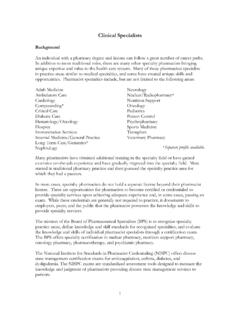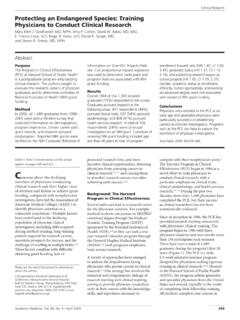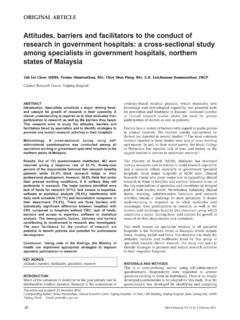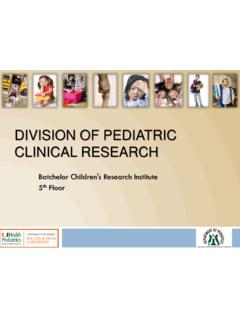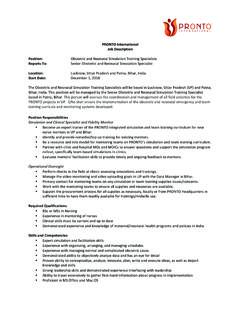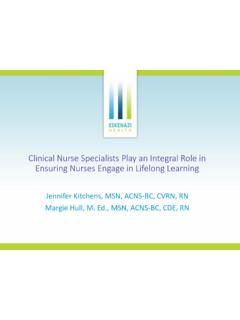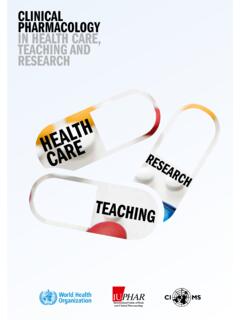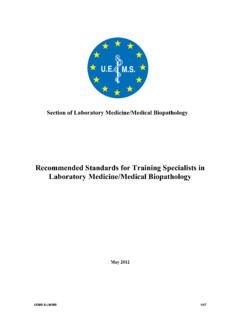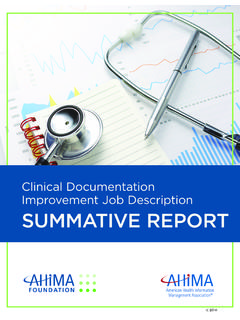Transcription of Profile 07 Clinical specialist 5.16.13EACREV Final 071113
1 1 2013 by the American Pharmacists Association. All rights reserved. APhA Career Pathway Evaluation Program for Pharmacy Professionals Clinical specialists Background An individual in the profession of pharmacy can follow a great number of career paths. In addition to more traditional roles, there are many other Clinical pharmacists bringing unique expertise and value to the health care system. Many of these pharmacists specialize in practice areas similar to medical specialties, and some have created unique skills and opportunities. Pharmacist specialties include, but are not limited to the following areas: Adult Medicine Ambulatory Care* Cardiology Compounding* Critical Care Diabetic Care Hematology/Oncology Hospice Immunization Services Internal Medicine/General Practice Long-Term Care/Geriatrics* Nephrology Neurology Nuclear/Radiopharmacy* Nutrition Support Pediatrics Poison Control Psychopharmacy Sports Medicine Transplant Veterinary Pharmacy *Separate Profile available.
2 Many pharmacists have obtained additional training in a specific disease state or have gained extensive on-the-job experience and have gradually migrated into that Clinical area. Most started in traditional pharmacy practice and then pursued the Clinical practice area for which they had a passion. In most cases, Clinical specialists do not hold a separate license beyond their pharmacist license. There are opportunities for pharmacists to become certified or credentialed to provide unique services upon achieving adequate experience and, in some cases, passing an exam. While these credentials are generally not required to practice, it documents to employers, peers, and the public that the pharmacist possesses the knowledge and skills to provide specific Clinical services.
3 The mission of the Board of Pharmaceutical Specialties (BPS) is to recognize specialty practice areas, define knowledge and skill standards for recognized specialties, and evaluate the knowledge and skills of individual pharmacist specialists through a certification exam. The BPS offers certification in nuclear pharmacy, nutrition support pharmacy, oncology pharmacy, pharmacotherapy, and psychiatric pharmacy. The National Institute for Standards in Pharmacist Credentialing (NISPC) offers disease state management certification exams for anticoagulation, asthma, diabetes, and dyslipidemia. The NISPC exams are standardized assessment tools designed to measure the knowledge and judgment of pharmacists providing disease state management services to patients.
4 2 2013 by the American Pharmacists Association. All rights reserved. APhA Career Pathway Evaluation Program for Pharmacy Professionals Credentials may be offered by other organizations, depending on the Clinical area. For example, the American Association of Poison Control Centers (AAPCC) offers a certification exam for Clinical specialists in poison information. The exam is offered to pharmacists and other health professionals who have met minimum practice requirements. Regional poison centers are required to maintain a minimum number of certified specialists on staff. The American Academy of Clinical Toxicology (AACT) offers a credentialing process and, upon successful completion of a certification exam, awards diplomat status in the American Board of Applied Toxicology (ABAT), which is an organization for the unique purpose of fostering the development of Clinical toxicology among the non-physician, non-veterinarian members of the AACT.
5 While credentials are important for pharmacists practicing in unique areas, work must continue to address competition among health care professionals and compensation for services. Characteristics Sixty-nine pharmacist Clinical specialists responded to the 2012 APhA Career Pathway Evaluation Program survey. Eighty percent of respondents held an entry-level or post bachelorette PharmD degree. Twenty-four percent indicated that they also had a non-pharmacy bachelor s degree and 40% indicated an advanced degree (MA, MS, MBS, PhD, or other). Forty-two percent had been through a residency program, 39% had been through a certificate training program, and 18% reported having been through some form of other training . Respondents average age was 43 years old.
6 Three-quarters (71%) of respondents were female. Income data show the under a quarter (21%) earn less than $100,000, while 69% earn $100,000 or more per year, with 5% earning greater than $150,000. The average time worked per week was hours. A majority of respondents indicated that they were satisfied with their job, with 51% indicating extremely satisfied and 42% indicating somewhat satisfied. Similarly, most respondents indicated that they felt the job was quite challenging, with 51% indicating extremely challenging and 45% indicating somewhat challenging. Insider s Perspective What aspects of the job are most appealing? Because of the great variety of Clinical specialist positions, work environments, duties, and responsibilities, the aspects of the jobs that were most appealing and least appealing overlap less than in other careers.
7 What is true for one Clinical practice is not necessarily true for other practices. The ability to work on a team with other health care professionals to directly improve patient care was frequently mentioned as the most appealing aspect of a career in Clinical practice. Many pharmacists working in Clinical areas have a great deal of patient contact, whereas others have minimal contact with patients and work primarily with other health providers. 3 2013 by the American Pharmacists Association. All rights reserved. APhA Career Pathway Evaluation Program for Pharmacy Professionals Respondents also indicated that they spend 36% of their time on patient care services and 16% of their time on medication management services.
8 What aspects of the job are least appealing? Administration (bureaucracy) and paperwork were both cited by many of pharmacist Clinical specialists as one of the least appealing aspects of their jobs. These pharmacists are very satisfied with the work they perform, but do not enjoy the record keeping that needs to be completed to substantiate their services or to quantify outcomes. Long hours, staffing concerns, and heavy workload were each cited by respondents as well. Notably, pharmacist Clinical specialist positions are dependent on patient load and other factors that are beyond control of the pharmacist. One pharmacist commented that there is too much work for one person to accomplish all tasks. What advice should students and practitioners consider when selecting the option of becoming a Clinical specialist ?
9 Respondents reported that it is important for pharmacist Clinical specialists to participate in continual training . As in any Clinical practice, a certain level of expertise is expected of the practitioner. Continuing education and training is important to succeed in this environment. One pharmacist Clinical specialist commented, [These positions] require continuous studying/staying on top of current guidelines and literature. Some Clinical specialists work in fast-paced environments requiring quick decisions, whereas others work in environments that are more structured and self-paced. The demands of the work environment should be considered when choosing a career path or practice that is suited to the pharmacist s individual preference.
10 One respondent indicated that it is necessary to have good communication skills and willingness to spend many extra hours in the workplace as well as outside the workplace, reading, learning, etc. Another pharmacist said students should be willing to take advantage of different opportunities, noting, make sure the practice environment is right for you which includes the hours and location. 4 2013 by the American Pharmacists Association. All rights reserved. APhA Career Pathway Evaluation Program for Pharmacy Professionals Critical Factor Ratings Interaction With People Interaction with people was cited by some pharmacist Clinical specialists as the most appealing aspect of their work. As noted earlier, respondents reported that they spend 36% of their time in patient care areas.
